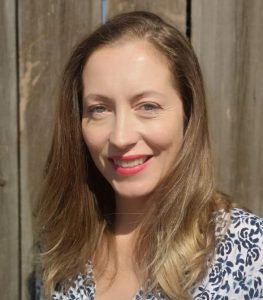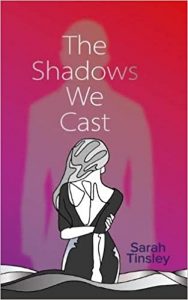Uncomfortable Books Are Important
by Sarah Tinsley
 Everyone wants to realise at least one of their dreams. For me, that happened just a few weeks ago. With the release of my debut novel The Shadows We Cast, the book I started over seven years ago finally exists in the world. But when people ask me what it’s about, it’s always awkward. I smile, I nod, perhaps offer a toned-down version of the truth. It’s about men and women, I say. About consent and control. About sexual assault. Or, when I’m being the most honest, I tell them it’s about rape.
Everyone wants to realise at least one of their dreams. For me, that happened just a few weeks ago. With the release of my debut novel The Shadows We Cast, the book I started over seven years ago finally exists in the world. But when people ask me what it’s about, it’s always awkward. I smile, I nod, perhaps offer a toned-down version of the truth. It’s about men and women, I say. About consent and control. About sexual assault. Or, when I’m being the most honest, I tell them it’s about rape.
Which doesn’t exactly make for light conversation. Reactions have included a confused squint, a glance at the person next to them, or an excuse to leave. In those moments I wonder why I couldn’t have written a cosy mystery, something easily discussed and easily read. But that, I suppose, is exactly why I wrote it in the first place.
Writing hasn’t always come easily for me. I wasn’t a quiet girl, filling pages of notebooks with stories, hiding from the world. Quite the opposite. I always sought out groups and loudness. Books were one of the few things that could make me sit still.
It wasn’t until I was in my thirties that I started, properly, to write. I got onto a Masters course, as much for the confidence boost as anything else, and turned my attention to the page.
Almost everything I wrote was dark. It was filled with my anger at the world for its wrongs. My short stories feature abuse, postnatal depression, death and loveless marriages. Once I’d found a voice to write with, I wanted to uncover those stories we don’t always hear. Stories that chart the difficulties of female lives, along with their hopes and joys.
I knew I wanted my first novel to be a dual narrative from the point of view of a man and a woman, but I didn’t know it would end up documenting one of the most awful things that can happen between them. My novel, The Shadows We Cast, is a dual narrative that shows the aftermath of rape from the point of view of both the victim and the perpetrator.
It’s not that rape never happens in literature. From Game of Thrones to An Inspector Calls, its prevalence probably mirrors how often it happens in society. But all too often it’s used as a plot point, a way of smearing a character’s reputation, rather than an opportunity to explore its impact or the reasons it happens. I came across the term ‘fridging’ in a talk at the Women of the World festival, which is where the hero’s wife/daughter/mother is abused, killed and put in a fridge. This is to spur the hero into action, a way of discarding the female character quickly in order to give someone else agency.
This is why my book starts immediately after the assault. Nina is my female protagonist, and hers is a story of trauma. It explores how an awful event can impact a strong, independent woman. She struggles for clarity, sanity and closure in a world where actual justice is incredibly hard to come by. Currently, less than 1 in 60 reported rape cases lead to even a charge or summons in the UK.
The other side of the book was, to put it lightly, a little trickier. The inspiration for Eric came from the case of Jill Meagher, a woman who was raped and murdered by an escaped convict. Two things really stood out to me in an article her husband wrote. Firstly, that he was surprised how ‘normal’ the man looked. Not the ‘lone monster’ we’re told to look out for who might be hiding in the bushes. Secondly, that this case, although tragic, was not the norm. The vast majority of sexual assault and abuse takes place in the home. The perpetrator is far more likely to be someone known to the person, someone they assumed was ‘safe.’ And so, the idea of Eric, someone who doesn’t ‘look like’ a rapist, was born.
Writing his part of the book was hard. I certainly didn’t want to put in his point of view ‘for balance,’ as if it would somehow excuse him, but I also wanted to write a real human being that does something awful. The biggest decision I made was, to begin with, he believes what happens is consensual. While it might make for difficult reading, it felt incredibly important that I showed him as a product of society as well as a flawed individual. That he has internalised skewed ideas about women’s sexuality, about silence equalling consent, about something only being an attack if you are physically being fought off. I believe these are all important factors in understanding why sexual assault happens.
Assault is, unfortunately, incredibly prevalent. And it tends to be, for the most part, incredibly sneaky. I found a disturbing Reddit thread which I quote almost word for word in the book. A man is boasting about how he coerced women to sleep with him. Just like I May Destroy You revealed the multiple actions that are classified as rape in different countries, my research into the book showed me that the way assaults happen are varied, and that we need to stop only fearing and blaming the ‘lone madman’ in the bushes. We need to look into wider issues in society to better understand and prevent these awful crimes.
It’s not that I think all literature should be dark. I certainly hope that my book has light touches of humour, humanity and hope. But the books and stories I’ve always loved the most are those that, at some point, expose a murky truth about humanity. The first book I ever saw this in was Lord of the Flies. I was probably fifteen at the time, and I remember staring at the page, baffled that the darkness of people could be found in a story about boys on an island.
Sometimes stories are a pleasant escape. But they have always been, and should always remain, a place to explore the dark side of ourselves. A safe place to see the things that go bump in the night. I hope my book opens up conversations about sexual assault. I hope it uncovers the humanity that is often lacking from statistics. I hope it gives people hope for the future.
Sarah is raising money for Rape Crisis England and Wales through their ‘Step Out In Solidarity’ Campaign. You can donate here.
—
BIO: Sarah is a British writer living in France. She explores gender issues in her writing and helps others explore their creative selves through workshops and courses. Her first novel, The Shadows We Cast won the Spread the Word/Bookouture competition in 2020 and is published by SRL Publishing in January 2022. Her short fiction has been published widely, including in Mslexia and Litro, and she came third in the Bristol Short Story Prize in 2021. She also coordinates Write By You, a writing project for underrepresented young female writers in the UK. For more visit https://sarahtinsley.com and follow @sarahtinsleyuk
THE SHADOWS WE CAST
 What if you couldn’t recognise the violence in others? Or in yourself?
What if you couldn’t recognise the violence in others? Or in yourself?
Nina refuses to accept the role of passive victim after being sexually assaulted. She becomes obsessed with an online vendetta that risks her job, her friendships, and her sanity.
Eric thinks, if anything, he’s too nice. But when he takes advantage of a stranger he is forced to confront the kind of man he really is.
The Shadows We Cast is a dark novel about consent and control that unsettles ideas about victims and villains.
BUY HERE
Category: Contemporary Women Writers, On Writing























